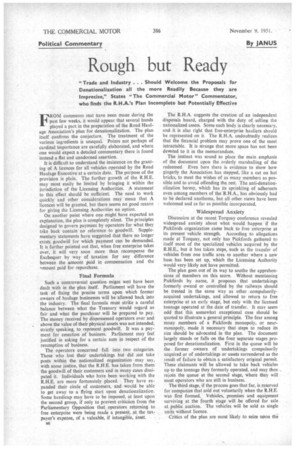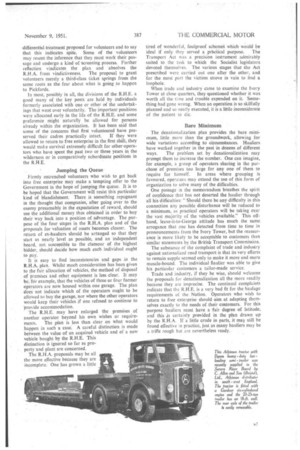Political Commentary
Page 40

Page 41

If you've noticed an error in this article please click here to report it so we can fix it.
Rough but Ready
"Trade and Industry . . . Should Welcome the Proposals for Denationalization all the more Readily Because they are Imprecise," States "The Commercial Motor" Commentator, who finds the R.H.A.'s Plan Incomplete but Potentially Effective
By JANUS
FROM comments mat nave oeen mane during the past few weeks, it would appear that several hands played a part in the preparation of the Road Haulage Association's plan for denationalization. The plan itself confirms the conjecture. The treatment of the various ingredients is unequal. Points not perhaps of cardinal importance are carefully elaborated, and where one would expect a detailed commentary there is found instead a flat and unadorned assertion.
It is difficult to understand the insistence on the granting of A licences for all vehicles operated by the Road Haulage Executive at a certain date. The purpose of the provision is plain. The further growth of the R.H.E. may most easily be limited by bringing it within the jurisdiction of the Licensing Authorities. A statement to this effect should be sufficient. The need to work quickly and other considerations may mean that A licences will be granted, but there seems no good reason for giving the Licensing Authorities no option.
On another point where one might have expected an explanation, the plan is completely silent. The principles designed to govern payment by operators for what they take back contain no reference to goodwill. Supplementary statements have suggested that there no longer exists goodwill for which payment can be demanded. It is further pointed out that, when free enterprise takes over, it will very soon more than recompense the Exchequer by way of taxation for any difference between the amount paid in compensation and the amount paid for repurchase.
Final Formula Such a controversial question migrit well have been dealt with in the plan itself. Parliament will have the task of fixing the precise terms upon which former owners of haulage businesses will be allowed back into the industry. The final formula must strike a careful balance between what the Treasury would regard as fair and what the purchaser will be prepared to pay. The money received by dispossessed operators over and above the value of their physical assets was not intended. strictly speaking, to represent goodwill. It was a payment for cessation of business. Parliament may feel justified in asking for a certain sum in respect of the resumption of business.
The operators concerned fall into two categories. Those who lost their undertakings but did not take posts within the nationalized organization may say, with some justice, that the R.H.E. has taken from them the goodwill of their customers and in many cases dissipated it. Individuals who have been working with the R.H.E. are more fortunately placed. They have expanded their circle of customers, and would be able to get away to a flying start upon denationalization. Some handicap may have to be imposed, at least upon the second group, if only to prevent criticism from the Parliamentary Opposition that operators returning • to free enterprise were being made a present, at the taxpayer's expense, of a valuable, if intangible, asset.
B6 The R.H.A. suggests the creation of an independent disposals board, charged with the duty of selling the nationalized assets. Some such body is clearly necessary, and it is also right that free-enterprise hauliers should be represented on it. The R.H.A. undoubtedly realizes that the financial problem may prove one of the most intractable. It is strange that more space has not been devoted to it in the memorandum.
The instinct was sound to place the main emphasis of the document upon the orderly marshalling of the redeemed. Even here there is evidence to show how gingerly the Association has stepped, like a cat on hot bricks, to meet the wishes of as many members as possible and to avoid offending the rest. The anti-denation: alization heresy, which has its sprinkling of adherents even among members of the R.H.A., has obviously had to be declared anathema, but all other views have been welcomed and as far as possible incorporated.
• Widespread Anxiety
Discussion at the recent Torquay conference revealed widespread anxiety about what would happen if the Pickfords organization came back to free enterprise at its present vehicle strength. According to allegations made at Torquay, not only has Pickfords gathered to itself most of the specialized vehicles acquired by the R.H.E., but it has taken steps, such as the transfer of vehicles from one traffic area to another where a new base has been set up, which the Licensing Authority would very likely not have permitted.
The plan goes out of its way to soothe the apprehensions of members on this score. Without mentioning Pickfords by name, it proposes that undertakings formerly owned or controlled by the railways should be treated in the same way as other compulsorilyacquired undertakings, and allowed to return to free enterprise at an early stage, but only with the licensed tonnage operated at the date of transfer. It may seem odd that this somewhat exceptional case should be quoted to illustrate a general principle. The fear among many members of a Pickfords monopoly, or nearmonopoly, made it necessary that steps to reduce its size should be advocated in the plan. The document largely stands or falls on the four separate stages proposed for denationalization. First in the queue will be the former owners of undertakings compulsorily acquired or of undertakings or assets surrendered as the result of failure to obtain a satisfactory original permit. These claimants will be allowed to take back vehicles up to the tonnage they formerly operated, and may then rejoin the queue at the second stage, where they will meet operators who are still in business.
The third stage, if the process goes that far, is reserved for companies that sold out voluntarily when the R.H.E. was first formed. Vehicles, premises and equipment surviving at the fourth stage will be offered for sale at public auction. The vehicles will be sold as single units: without licence.
Critics of the plan are most likely to seize upon the
differential tieatment proposed for volunteers and to say that this indicates spite. Some of the volunteers may resent the inference that they must work their passage and undergo a kind of .screening process. Further reflection vindicates the plan and absolves the
R.H.A. from vindictiveness. The proposal to grant volunteers merely a third-class ticket springs from the same roots as the fear about what is going to happen to Pickfords.
In most, possibly in all, the divisions of the RILE. a good many of the key posts are held by individuals formerly associated with one or other of the undertakings that went over voluntarily. The important positions were allocated early in the life of the R.H.E. and some preference Might naturally be allowed for persons already within the organization. It has been said that some of the concerns that first volunteered have pre
served their cadres practically intact. If they were allowed to return to free enterprise in-the first shift, they would make survival extremely difficult for cither,operators who have spent the past two or three years in the wilderness or in comparatively subordinate positions in the R.H.E.
Jumping the Queue Firmly entrenched volunteers who wish to get back into free enterprise may make a tempting offer to the Government in the hope of jumping the queue. It is to be hoped that the Government will resist this particular kind of blandishment. There is something repugnant in the thought that companies, after going over to the enemy presumably in the expectation of reward, should use the additional money thus obtained in order to buy their way back into a position of advantage. The purpose of the four stages in the RBA. plan and of the proposals for 'valuation of assets becomes clearer. The return of ex-hauliers should be arranged so that they start as nearly level as possible, and an independent board, not susceptible to the clamour of the highest bidder, should decide how much each individual ought to pay.
It is easy to find inconsistencies and gaps in the R.H.A. plan. Whilst much consideration has been given to the fair allocation of vehicles, the method of disposal of premises and other equipment is less clear. It may be,' fdr example, that the vehicles of three or four former operators are now housed within one garage. The plan does not indicate which of the operators ought to be allowed to buy the garage, nor where the other operators would keep their vehicles if one refused to continue to 'provide accommodation.
The RI-I.E. may have enlarged the premises of another operator beyond his own wishes or require
ments. The plan is less than clear on what would happen in such a case: A careful distinction is made between the value of an acquired vehicle and of a new vehicle bought by the R.H.E. This distinction is ignored so far as property-and plant are concerned.
The R.H.A. proposals may be all the more effective because they are incomplete. One has grown a little
tired of wonderful, foolproof schemei which would he
ideal if only they served a practical purpose. The
Transport Act was a precision instrument admirably suited to the task to which the Socialist legislators devoted themselves. The various stages that the Act prescribed were carried out one after the other, and for the most part the victims strove in vain to find a loophole.
When trade and industry came to examine the Ivory Tower at close quarters, they .questioned whether it -was worth all the time and trouble expended on it. Something had gone wrong. When an operation is so sk.ilfuLly planned and so neatly executed, it is a little inconsiderate of the patient to die.
Bare Minimum The denationalization plan provides the bare minimum, little more than the groundwork, allowing for wide variations according to circumstances. Hauliers have worked together in the past in dozens of different ways. The problem set, by denationalization may prompt them to increase the number. One can imagine, for example, a group of operators sharing in the purchase of premises too large for any one of them to require for himself. In areas where grouping is favoured, operators may extend the use of this form of organization to solve many of the difficulties.
One passage in the memorandum breathes the spirit of confidence that has not deserted the haulier through all his difficulties: "Should there be any difficulty in this connection any possible disturbance will be reduced to a minimum, as practical operators will be taking over the vast majority of the vehicles available." This offhand, leave-it-to-George attitude has much the same arrogance that one has detected from time to time in pronouncements from the Ivory Tower, but the reassurance is more likely to be acceptable to customers than
similar statements by the British Transnort Commission.
The substance of the complaint of trade and industry against nationalized road transport is that its very efforts to remain supple seemed only to make it more and more muscle-bound. The individual haulier was able to give his particular customers a tailor-made service.
Trade and industry, if they be wise, should welcome the proposals for denationalization all the more readily because they are imprecise. The continual complaints indicate that the R.H.E. is a very bad fit for the haulage requirements of the Nation. Operators who wish to return to free enterprise should aim at adapting themselves exactly to the needs of their customers. For this purpose hauliers must have a fair degree of latitude,
and this .is certainly provided in the plan drawn up by the R.H.A. If a little crude in parts, it may still be found effective in practice, just as many hauliers may be a trifle rough but are nevertheless ready.




















































































